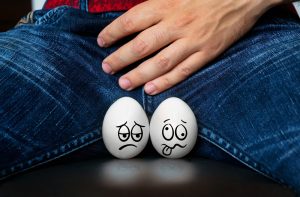Testosterone is an anabolic steroid hormone that is found in large amounts in men. It helps in the development of the male reproductive system and promotes male secondary sexual characteristics. Some of its most notable functions are:
- Growth and development of the penis, testes, and prostate
- Muscle strength and mass
- Bone density and mass
- Growth of body hair
- Sex drive or libido
- Deepening of the voice
Understanding Testosterone Levels
The amount of testosterone that a man produces peaks around late teens to early 20s, and gradually declines year after year once he is in his 30s. Because of this, older men are prone to suffering from low testosterone and the negative side effects that come with it.
The normal testosterone levels in men vary according to age. Post-puberty to early 20s, the normal range is around 250 nanograms per deciliter to 1,100 nanograms per deciliter. After age 30 to early 40s, the normal testosterone levels are about 200 nanograms per deciliter to 1,000 nanograms per deciliter. From mid-40s to mid-50s, the normal range is from 170 nanograms per deciliter to 900 nanograms per deciliter. And, from late 50s and older, normal testosterone levels are around 150 nanograms per deciliter to 850 nanograms per deciliter.
Those whose testosterone levels are below the normal range for their age group are considered to have low testosterone, and they have to see a doctor to receive low testosterone treatment as soon as possible.
Causes of Low Testosterone
There are many things that can cause a decline in testosterone levels.
Aging
It is a known fact that testosterone levels naturally decline with age, so older men tend to have lower testosterone levels than teens or men in their 20s.
Testicular injury
If you have been punched, kicked, or hit in the testicles, the trauma can cause an injury to your testicles, and lead to problems in producing enough testosterone.
Testicular cancer

The growth of a cancerous tumor in your testicular region can put your testosterone production in danger. If the cancer cells spread, your testosterone levels, as well as sperm production and other sexual and reproductive function, may be in jeopardy.
HIV
HIV or the Human Immunodeficiency Virus is a widespread sexually transmitted disease that can bring severe harm and damage to your reproductive system and functions, including your testicles and testosterone production.
Obesity
Being obese is not only bad for your heart, liver, kidneys, and joints, it is also detrimental to your body’s testosterone production and other sexual functions.
Ways to Boost Testosterone
Having low testosterone levels can bring about a lot of problems that can negatively impact your physical, mental, emotional, and sexual dispositions. To get your testosterone levels back up, you should try the following testosterone-boosting methods:
Eat a healthy diet
Make sure to include more fruits and vegetables in your daily meals in order to feed your body with essential vitamins and minerals that can help in enhancing your testosterone levels. Foods that are loaded with zinc, vitamin D, and amino acids are highly recommended as these nutrients are known to have natural testosterone-boosting abilities. In addition, stick to foods that contain the healthy kinds of fat, carbohydrates, and protein, and get rid of foods that have high concentrations of salt, sugar, and preservatives.
Quit bad habits
If you smoke or drink alcohol a lot, you are not only hurting your vital organs but also your testosterone levels. Cigarettes and alcohol contain chemicals that are toxic to the body and can lead to a decrease in your testosterone levels. They are also detrimental to your cardiovascular, respiratory, renal, nervous, and immune health.
Manage stress levels
Being always stressed raises your cortisol levels and impedes your testosterone production. Cortisol and testosterone are hormones naturally produced by the body that have a seesaw type of relationship with one another —- if one goes up, the other goes down. If you can learn how to manage your stress levels better, such as by exercising and meditating, you can stop your cortisol from shooting up and negatively impacting your testosterone levels.
Exercise regularly
Physical activity on a regular basis is essential for optimal health. If you exercise two to three times a week, you not only can improve your heart, lung, brain, and immune functions, but also your testosterone levels. In addition, you can lose weight or maintain a healthy weight more easily, and lower your risk of infections, diseases, and other health problems.
Weight Lifting to Increase Testosterone
According to several studies, the human body typically responds to exercise or physical activity by producing more testosterone. And, among the different types of exercises, weight lifting has shown the most impressive results.

By doing weight lifting routines that target the large muscle groups, such as the chest, legs, and arms, you can gain huge increases in testosterone production than by doing other types of exercises.
To work your chest, you can do bench presses (flat, decline, or incline), dumbbell chest fly, or cable crossover. For the legs, try the Bulgarian split lunge, barbell squat, barbell lunge, barbell deadlift, calf raise, hip thrusters, hamstring curl, and leg extension. For the arms and the shoulders, do close grip bench press, barbell bicep curls, dips, seated bicep curl, chins, military press, behind the neck press, seated dumbbell press, anterior raise, medial raise, and rear deltoid fly.
Doing back exercises, such as pull ups, barbell shrug, upright row, and bent over barbell row; and abdominal exercises, such as hanging leg raises, weighted abdominal crunch, Russian twist, and weighted rope pull down are also highly recommended.
Weight Lifting Tips for Best Results
You have to be careful when weight lifting to not hurt yourself or put yourself in a worse situation.
Talk to your doctor about starting a weight lifting routine. Have a fitness expert supervise you when you train to know if you are doing something wrong, and so on.
Do not overtrain. Do not push yourself to workout several hours everyday. You should give yourself at least one day of rest in between your workout days to allow your body to heal and recover.
Change your lifestyle. Weight lifting cannot do it all alone. You have to also eat healthily, quit your bad habits, and sleep well to achieve your testosterone goals.







